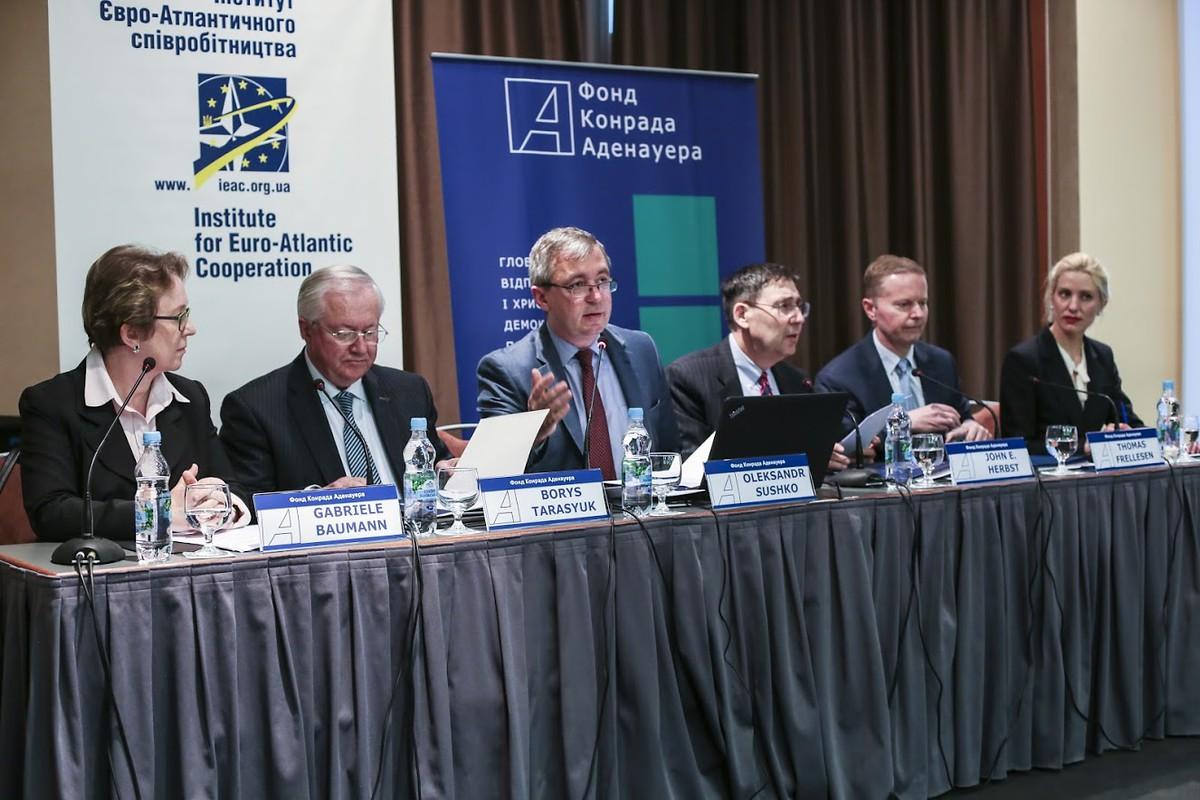Veranstaltungsberichte
20 years ago the United States and the European Union announced a “New Transatlantic Agenda“. The “New Transatlantic Agenda” is one of the key documents of the Euro-Atlantic Partnership and was a joint commitment to build bridges across the Atlantic, to work closely together to foster economic relations and trade, and to promote peace and democracy. Russia and Ukraine were to become partners on security issues. With the annexation of Crimea and the ongoing conflict in Eastern Ukraine the transatlantic partnership has become beyond doubt vital for Ukraine, while Russia in contrast is talking of a “new Cold War”. In this new context, the Euro-Atlantic Partnership is more important than ever.
Against this background, more than 20 key experts and over 200 participants attended the 6th Euro-Atlantic Forum for Leadership and Solidarity from 18th-19th April 2016 in Kyiv, which was jointly organized by the Ukraine Office of the Konrad-Adenauer-Stiftung, the Institute for Euro-Atlantic Cooperation, and the Atlantic Council from Washington DC. It has been the first Euro-Atlantic Forum in Kyiv since the Revolution of Dignity of Winter 2013-2014 and it took place in a completely changed political and foreign policy context – a context that could not have been imagined a few years ago, let alone 20 years ago when the “New Transatlantic Agenda” was born.
The Euro-Atlantic Forum started with a high-level introductory panel dedicated to this new context and discussions around the current transatlantic agenda. John E. Herbst, the Director of the Atlantic Council's Dinu Patriciu Eurasia Center and former US Ambassador to Ukraine, emphasized that there is no need for a “new” transatlantic vision. Instead, the existing vision needs to be defended because, as Herbst noted, the “very fact that the Kremlin says it wants to have a sphere of influence is a blow against the notion of an undivided Europe whole and free.” In the view of Borys Tarasyuk, Member of the Ukrainian Parliament and former Minister of Foreign Affairs, there is not enough leadership in the transatlantic space. Also ideas about alternatives to NATO will not withstand the test of time and reality. The Chargé d'Affaires a.i. of the Delegation of the EU to Ukraine, Thomas Frellesen, was involved in the negotiation of the “New Transatlantic Agenda” in the 1990s. According to Frellesen, the following enlargement of the EU and NATO is one of the biggest successes of transatlantic cooperation. In this respect, Svitlana Zalishchuk, Head of the Subcommittee on Euro-Atlantic Cooperation and European Integration in the Ukrainian Parliament, highlighted that Ukraine “knocks today at the doors of NATO as a partner” and reforms for Ukraine’s NATO perspective are being implemented.
On the second day of the Euro-Atlantic Forum, four high-level panel discussions took place on political leadership, on economic integration, security aspects and energy security in the transatlantic space. The speakers addressed a wide range of issues starting with the question about who can form the new generation of leaders in the transatlantic space to the problems of pipeline politics and energy dependence. Intense discussions emerged also around the possible impact of Eurosceptic tendencies, the British referendum in June and the upcoming US elections on the Euro-Atlantic partnership. The “New Transatlantic Agenda’s” statement that “domestic challenges are not an excuse to turn inward” still holds true today. Also questions of security policy, such as NATO’s new strategy towards Russia, as well as the ongoing conflict in Eastern Ukraine and the Russian annexation of Crimea were discussed. Overall, many speakers stressed that a democratic, successful Ukraine within Europe is the strongest answer and would be “a nightmare” for the Russian government, as Hanna Hopko, Head of the Foreign Affairs Committee in the Ukrainian Parliament, phrased it.
The Euro-Atlantic Forum received high media attention. Several Ukrainian media outlets reported on the Euro-Atlantic Forum, among others the ICTV news service “Fakty“ and the 5th Channel TV program “Faktor Bezpeky“ (both in Ukrainian).




